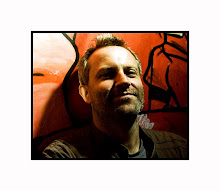54 words.
Woke up late. And felt like something that should not be allowed to exist had laid eggs in my chest that were beginning to hatch. I've had what I suspect is a chest infection for the last few weeks and a long night of alcoholic drinks and cold air had done its best to set my recovery back. I managed to traipse over to the hotel in time for the James Herbert interview at noon.
I'm in two minds about James Herbert. I read him a great deal when I was in my teens and thought his books were terrific – shorter than your average horror novel, they zipped along nicely – but as time went on and my reading broadened, I found his writing style wasn't what I was looking for any more. The last novel of his I read was Haunted, back in the late '80s or early '90s I read it in an evening. He does have that ability to drag you into a story and keep you going. An amazing knack, and one I wish I had a fraction of.
Anyway, the best bit of the interview came when Neil Gaiman, who was asking the questions, referred to the slew of imitators that had crawled out of the woodwork after Herbert's The Rats became an overnight success in 1974. 'Guy N Smith, for example,' said Gaiman (I'm paraphrasing here) 'and all I can do when I pick up a Guy N Smith novel is laugh out loud.'
'I think he's in the audience,' Herbert said. He was. To be fair to Neil Gaiman, after a stunned moment, he rescued the moment brilliantly...
After the interview I met the splendid John Berlyne for coffee and a chat and then attended a panel later in the afternoon in which various writers tried to explain how they positioned themselves in terms of whether they were horror writers, and Simon R Green merely droned on interminably about how great he was. After half an hour of this I was starting to feel pretty grim. I was due to be on a panel in the early evening but I knew I was not going to make it. I made my excuses to the organisers, had a wander around the Lanes for a while, buying little presents for munchkins and Rhonda, and got back to my B&B by 5pm. I tried to do some writing and failed miserably. I was a Brighton crock. I thought a little nap might improve me to the extent that I would be able to attend the Quercus launch at 10pm (keep an eye on Tom Fletcher, a very good, young British writer whose The Leaping is out imminently), but then I woke up at 1am and that was Saturday gone...
Tuesday, 30 March 2010
Day Nineteen... Wheels Come Off
Labels:
Guy N Smith,
James Herbert,
John Berlyne,
Neil Gaiman,
novels,
Simon R Green,
Tom Fletcher,
writing
Subscribe to:
Post Comments (Atom)

3 comments:
you've got me curious as to how Neil Gaiman dragged himself out of that hole he briefly dug for himself.
though having such a way with words, it's not so surprising he did so.
I should have explained... he did it by basically digging a deeper hole for himself. He quoted from a Guy N Smith novel: 'He wasn't going to leave Pat Benson alone that night, crabs or no crabs.'
Cue audience uproar...
Maybe a way with words doesn't necesarily help you out with knowing which direction you should dig?
Post a Comment